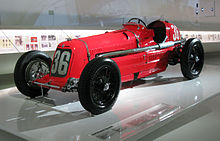This article relies largely or entirely on a single source. (March 2019) |
| Maserati 8CM | |
|---|---|
 Maserati 8CM | |
| Overview | |
| Manufacturer | Maserati |
| Production | 1933-1935 |
| Body and chassis | |
| Class | Race car |
| Layout | FR layout |
| Powertrain | |
| Engine | 3.0 L I8 |
| Transmission | 4-speed manual |
| Dimensions | |
| Wheelbase | 2560 mm |
| Curb weight | 750–785 kg (1,653–1,731 lb) |
| Chronology | |
| Predecessor | Maserati 8C |
| Successor | Maserati 6C 34 |
The Maserati 8CM is a Grand Prix race car produced by Italian manufacturer Maserati in Bologna between 1933 and 1935.
The car mounted a three-litre straight-eight cylinder engine, 2,991 cc from a 69 x 100 mm bore and stroke, maximum power was around 220–240 hp (162–177 kW) at 5,500 rpm. The drum brakes measure 400 mm in diameter. The chassis had been derived from that of the 4CM 1100, which proved to be too light and was subject to flex;[1] the situation improved when driver Tazio Nuvolari asked for a strengthening at the front while the weight was reduced from 785 to 750 kg.[1]

The car debuted at the Tunis Grand Prix in 1933 and also won the 1933 Belgian Grand Prix, driven by Nuvolari.[2] In 1934 and 1935, however, it struggled to match the pace of the Alfa Romeo, Mercedes and Auto Union, and was replaced by the 6C 34 and the V8RI model.[1]


- ^ a b c Melissen, Wouter (2017-05-10). "Maserati 8CM: Description and history". Ultimatecarpage.com. Archived from the original on 2017-07-23.
- ^ "Nuvolari gange Le Grand Prix de Belgique". La Journal (in French). 1933-07-10. p. 6.